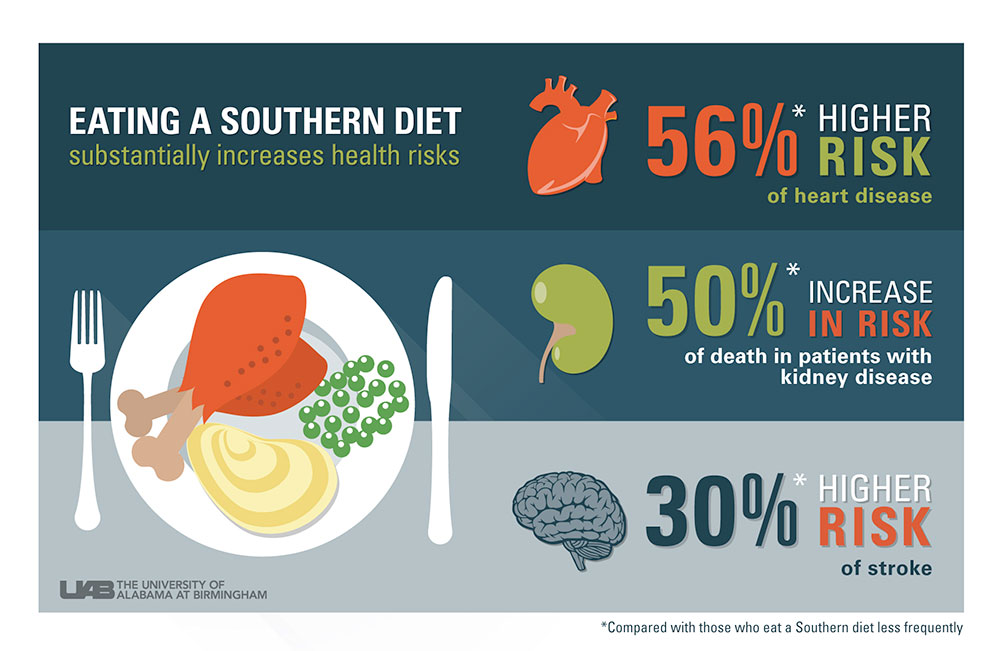Previous research from the University of Alabama at Birmingham has shown regularly consuming the “Southern-style” diet of fried foods, processed meats, foods high in fat and sugar-sweetened beverages, can lead to an increased risk of stroke and an increased risk of death for chronic kidney disease patients.
The latest research, published in Circulation, an American Heart Association journal, finds regularly consuming the “Southern-style” diet could raise your risk of heart disease — including heart attack and heart disease-related death.
Heart disease is the leading cause of death for both men and women in the United States, according to the Centers for Disease Control and Prevention, and the food you eat, along with the amount, is a risk factor.
Using data from the Reasons for Geographic and Racial Differences in Stroke, or REGARDS, study, a national, population-based, longitudinal study of white and black adults, the research team derived five dietary patterns using data from 17,418 participants: convenience, plant-based, sweets, Southern, alcohol and salad.
 Participants were placed into categories of adherence to these dietary patterns, and then comparisons were made between those who consumed the pattern the most to those who consumed each pattern the least. The Southern-style pattern saw the biggest increase to risk of heart disease.
Participants were placed into categories of adherence to these dietary patterns, and then comparisons were made between those who consumed the pattern the most to those who consumed each pattern the least. The Southern-style pattern saw the biggest increase to risk of heart disease.
“People who most often ate foods conforming to the Southern-style dietary pattern had a 56 percent higher risk of heart disease compared to those who ate it less frequently,” said study lead author James M. Shikany, Dr.P.H., professor in the Division of Preventive Medicine.
Shikany says no other dietary pattern was associated with heart disease risk.
“I’m not surprised regular consumption of a Southern-style diet impacts heart disease, but the magnitude of the increased risk for heart disease was surprising,” Shikany said. “However, I was more surprised we didn’t see a protective effect of the plant-based dietary pattern.”
Participants with a higher consumption of the Southern dietary pattern were typically younger than 65 years, male and a resident of the Stroke Belt (Alabama, Arkansas, Georgia, Louisiana, Mississippi, North Carolina, South Carolina and Tennessee).
“For anyone eating a lot of the main components of the Southern dietary pattern, I’d recommend they scale back on their consumption,” Shikany said. “If you’re eating bacon every morning, maybe cut back to only two or three days per week, or if you’re drinking four glasses of sweet tea or several sugar-sweetened soft drinks per day, maybe reduce that to one a day and replace those with non-sweetened beverages.”
Shikany says making smaller dietary changes — rather than going all in all at once — are more likely to be adhered to.
“I don’t like to recommend people completely eliminate foods because people don’t like that, and because of that, they won’t do it,” Shikany said. “So I advise gradual changes and not completely eliminating things that people enjoy eating. I think there’s plenty of room here for people to make changes and not completely eliminate a food item, while still improving their heart health.”